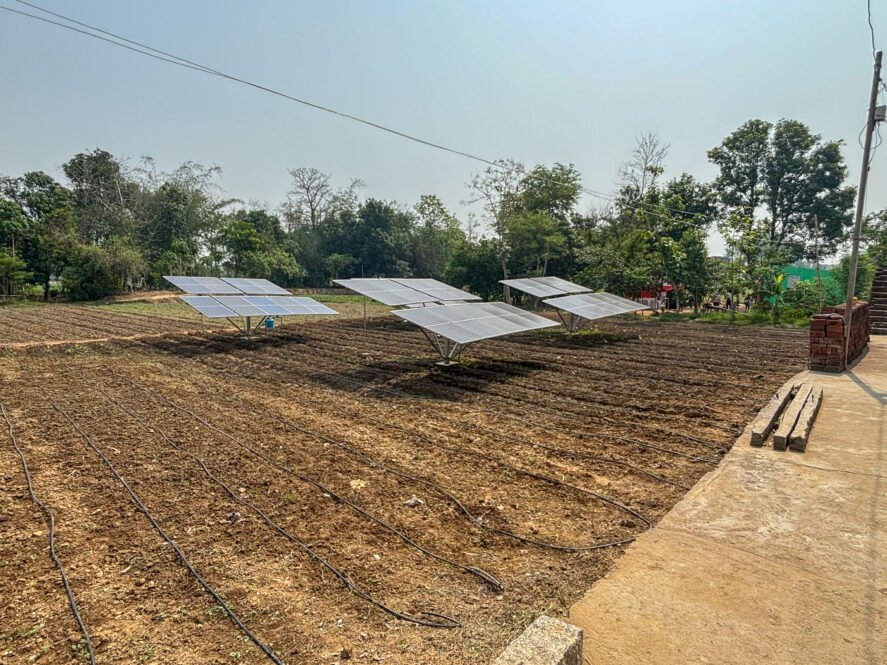Saturday, 21 February 2026

Agrivoltaics combines agriculture and solar power generation in an effort to prevent food production and energy production from competing for land.
The Tata-Cornell Institute for Agriculture and Nutrition (TCI) and Preservation and Proliferation of Rural Resources and Nature (PRAN), along with Jain Irrigation Systems, celebrated the inauguration of an agrivoltaics installation in Bihar’s Gaya ji district on June 9. The first agrivoltaics site to operate in the state, it demonstrates the potential for agrivoltaics to help lower greenhouse gas emissions from farming while increasing productivity.
The site was built through a partnership between TCI and PRAN, with assistance from Jain Irrigation Systems. Representatives from each organization were on hand for the inauguration.
Agrivoltaics combines agriculture and solar power generation in an effort to prevent food production and energy production from competing for land. On a typical agrivoltaics site, shade-tolerant crops grow beneath solar panels, allowing farmers to produce food while generating electricity.
At the TCI-PRAN site, located in the village of Nawada in Shargati block, energy generated by a 20-kilowatt solar array is used to power a grain mill and micro-irrigation systems. With support from TCI, the participating farmers co-financed and collectively own the installation. Access to reliable and affordable irrigation will allow the farmers to begin growing crops during dry seasons. The farms utilize drip and sprinkler systems, reducing the amount of water needed for cultivation. The farmers will also generate income by charging for grain mill services.
“This site is a significant step forward for agrivoltaics and sustainable agriculture in Bihar, demonstrating that climate-smart technologies can be a boon for both emissions reduction and crop production”, TCI Director Prabhu Pingali said. “We hope that farmers and policymakers learn from this installation to increase the effective adoption of agrivoltaics in Bihar and throughout India.”
In the future, TCI will aim to provide additional evidence on options for scaling up agrivoltaics systems. At the Nawada installation, TCI researchers will monitor its activities to explore how agrivoltaics might work in Bihar. They will pay particular attention to whether the site fulfills the farmers’ irrigation and grain processing needs and how it affects crop production and farmer incomes.
“We hope and expect that the availability of solar-powered irrigation will enable the farmers to expand their production to include high-value crops that they otherwise would not grow, which should result in increased income,” said Milorad Plavsic, TCI’s manager for strategic initiatives, who oversees the project for TCI.
“This is a unique project as it unites agricultural and solar power production, which enables a group of farmers to experiment with different intercropping designs and maximize income from their land while conserving water and reducing greenhouse gas emissions,” PRAN Director Anil Verma said. “In the following months, the PRAN team will support farmers and their family members through various capacity-building activities to ensure the sustainability of this agrivoltaics site.”
While visiting the site for the dedication, TCI Faculty Fellow Harold van Es, a professor of soil and water management at Cornell, collected some initial soil samples. Van Es and other researchers affiliated with TCI will monitor how the solar panels, irrigation and expanded crop production impact the health and productivity of the site’s soil.
The site in Nawada is part of TCI’s Zero-Hunger, Zero-Carbon Food Systems project, which aims to reduce the greenhouse gas emissions associated with agriculture while improving productivity and benefiting farmer livelihoods in Bihar. Now in its second phase, researchers are assessing the real-world impact of several emissions-reducing interventions. In addition to agrivoltaics, TCI is studying advanced crop management for rice production systems and the use of advanced breeding technology and methane-reducing feed supplements for livestock production.